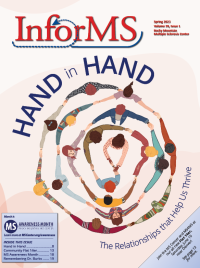InforMS: Could you please tell us about how you were diagnosed with MS?
Catherine: My diagnosis was completely unexpected. I was having some memory issues and I was tired, but I have 4 kids, a husband, and a full-time job, so the symptoms were there but they weren’t enough for me to be like “whoa, something is wrong”. It was absolutely terrifying. I simply woke up on the day of my 43rd birthday and felt off. Symptoms progressed over the next day and so I ended up in the ER. The doctors originally believed I was having a stroke. I was admitted right away and didn’t leave the hospital for a week. It was a very surreal time for me, and it was in August 2020, in the heart of COVID, so the protocols in the hospital didn’t allow for visitors. I felt very alone and scared.
InforMS: What is the experience of living with MS like for you these days?
Catherine: It took me a full year to accept what I was handed. I always thought it could happen to someone else, but never to me. That first year I gained a lot of weight and fell into a depression.
To the outside world, I probably looked OK. Inside, I wasn’t coping well at all. I didn’t want to tell anyone because I felt like there was something wrong with me, like I was broken. The unpredictability day-to-day was really hard for me to come to terms with. In August 2021, I decided, enough with the pity party. There is a reason I was handed this diagnosis and I didn’t want to waste another minute in my own self-pity. Today, I’m doing great. Personally, I deal with symptoms every day, but I feel fortunate that I am still here and still able to function. The diagnosis really helped me view life from a different perspective. Don’t sweat the small stuff and focus on experiences and memories rather than things. I’ve made a lot of great friendships through my MS connections.
InforMS: What are the most significant challenges you face with MS?
Catherine: My two biggest symptoms are fatigue and brain fog/memory loss. These are daily occurrences and the challenge is real. People that are closest to me understand those challenges and show me grace. However, I do feel somewhat judged being around people who don’t know that I have MS. Trying to act “normal” brings on a whole new level of challenge and just contributes more to the fatigue. Trying to get people to understand I’m not lazy, or if I push myself too hard one day, I’m pretty useless the next day, is also a pretty big challenge. Many people don’t understand that taking a nap doesn’t fix anything. I wake up fatigued.
Over time I’ve had to accept that I can’t do everything, but even today that’s really frustrating. I have to think ahead about what’s coming up later that day and even the next day, and it’s a challenge to have to maneuver your life that way. It is mentally exhausting to try to get the words out to explain what’s going on or why I’m having to make the decisions I am. Sometimes I just don’t have the energy in me to get the words out of my mouth. Every day I have body aches, so standing for long times, like cooking at the end of a day, can’t happen.
InforMS: What are the things that have helped you most with these challenges?
Catherine: For the brain fog and memory – I do things daily — thanks Wordle! — to try and keep my brain active. I’m an accountant so that works my brain every day. Sometimes, I just have to sit and take a deep breath if I completely forget what I am doing. Sometimes a good cry does the trick as well. I look at my calendar on Sunday to get an idea of what’s going on in the next week and I really think about which events and tasks I can commit to. It takes time to adjust to having to plan like that. I’ve built up a core support team who already knows about a lot of my challenges, so I don’t have to explain as much to them, which saves me energy when I’m low. I no longer feel the need to explain to strangers who don’t understand. Many strangers just kind of gloss over when you start telling them anyway. The people closest to me have taken the time to understand and will also do their own research to better understand.
I’ve found a love for spin classes, and I take anywhere from 3-6 classes/week. Being in those classes really helps me stay focused on the task at hand, while creating endorphins which also give me a boost of energy and overall make me feel self-confident. A lot of my regular spin buddies, as well as my spin instructors, know about the MS, and I love being around people who are uplifting and non-judgmental. It’s a way for me to be social since I mostly work from home. Also, I have left sided weakness, so taking the classes really helps my muscles.
InforMS: What things have people done that have been helpful to you?
Catherine: My 8-year-old son is the cutest. Over the summer I would sit out on the bleachers and watch his football games. But heat severely affects me and I would start losing function on my left side. He would notice the signs and would come to me and support my left side while walking me over to shade. But my entire family has been helpful to me. They understand that sometimes I have limitations and they don’t call me out or make fun of me when I’m talking and suddenly can’t find the words, or if I forget conversations, they just simply remind me. In the beginning, they would be surprised when I couldn’t remember a conversation from the day before. But as time has gone on, they’ve started to understand how serious it is and they’ve adjusted their expectations and empathy. They ask me what they can do to make my life easier, and they don’t make me feel bad when I’m having an off day. They understand when I cancel last minute plans.
InforMS: How does your family approach talking about MS and its challenges?
Catherine: We are very open within my family, so if someone has a question, they ask. If someone runs across an article on MS, or medical advances, we send it to each other. The hardest conversations I had surrounding MS were when I was diagnosed and having to let my loved ones know. I hadn’t processed it yet myself, and somehow I had to let people who love me the most in this world know that I had a chronic disease. But since then, nothing has been difficult to discuss. If I’m having a bad symptom day, no questions are ever asked and my family does what they can to adjust to that particular day. Most often, it is fatigue that has me down, so they will pick up my slack on that day – clean the house, do laundry, run errands.
InforMS: In what ways has your household adapted to better support you?
Catherine: My husband has been my greatest rock. Life doesn’t stop because I was dealt this hand. He has really stepped up as far as our son’s extracurricular activities are concerned and gets him to just about every practice. I also used to make dinner every night, but that has become a challenge for me. By the end of the day, I just don’t have the energy and my body aches too much to stand there chopping and prepping. So our dinner routine has changed somewhat. We are subscribed to a meal delivery service to make that easier on me, or sometimes my husband will stop and pick dinner up on the way home. I’ve had to get much more comfortable with asking for help, but it’s still a struggle because I always hated asking in the past. Even though it’s getting a little easier over time, I don’t think it will ever be truly comfortable. But I’ve seen what happens when I push beyond my limits, and I’m interested in finding the right balance which includes accepting help from others.
InforMS: Can you give examples of things your family has done to help?
Adam (Husband) – He listens to me when I’m having an off day. He notices when I’m really fatigued and without saying a word, he’ll do the laundry or clean the house. He’ll bring home dinner, no questions asked, when I tell him I’m tired. He attends every single one of my neuro appointments, he drives me to and from my infusions – the list goes on and on. He goes with me to my neurologist appointments to help make sure I remember all that they tell me. He has drastically changed his life so he can be more present for mine. He’s a tax partner and in the past, he would be at his office for long periods during tax season. I finally asked him to be home a little more often during those times. He realized that he doesn’t have to do all of that work from the office. Now, he’ll come home, have dinner with us and help with the kids, then work from home if he needs to get in additional hours.
Melanie (Daughter, age 28) – Melanie and I talk every single day. I think it’s her way of checking in to make sure I’m doing okay. She will do little things like bring me coffee or, if she sees something I’ll like, she’ll pick it up and surprise me with it. One time she brought me a blanket she knew I would love, which I now bring to my infusions. She is always available when I need something. Last year she cheered me on during my bike race. This year, she’s going to do it with me!
Tiffanie (Daughter, age 25) – When I was diagnosed and sitting in the hospital for a week, she would Facetime me. During that week, I had all the time in the world to Google about MS. That Googling made me realize that orange is the official MS color. So when Tiff texts me, she always sends me orange hearts to show her support. Every year for her birthday, she creates an MS fundraiser and last year she did part of my bike event with me.
Riley (Son, age 20) – Riley still lives at home, so he’s here to help around the house – he’ll do the dishes and take out the trash. He’ll run errands for me when I can’t get out of the house. He was the one who drove me to the ER when I was diagnosed. If I need help with anything, he’s always willing to drop whatever he has going on to help me out.
AJ (Son, age 8) – My youngest child – full of so many questions. At 8 years old, I’m not sure if he gets the full concept of this disease, but on occasion, he does ask very thought-provoking questions about it. He understands the symptoms and how they currently affect me. He will help me walk when my legs want to give out and he helps out around the house. He constantly checks in on me, asking how I’m doing. And when I need help with something physically, he never hesitates!
InforMS: What are some ways that you support yourself?
Catherine: I show myself a lot of grace. This one isn’t always easy as I spent the first 43 years of my life very independent, not needing help, and able to function daily. I’ve had to re-train myself and realize that I can’t always be independent now — sometimes I need help, and it’s okay to ask for that help. I always stay as active as possible, whether it be at the gym or taking walks, going on hikes, or swimming. I have created a bucket list of items I want to complete. I went sky diving in 2021, we took a 7-day cruise in 2022, in case the day ever comes that I am not able to enjoy these activities. I am living my best life.
To support myself health wise, I make sure I take my daily vitamins, and I never miss an infusion. I keep up with all of my doctor appointments, as well as my yearly MRI. And to support myself and others living with MS, I fundraise and participate in MS community events, I attend and participate in the MS Gala, I have volunteered at KADEP with the sensory garden and during their holiday celebrations. And this year I’m attending Drag Queen Bingo.
When I run into negativity on Facebook or in support groups, I can choose to just scroll by without letting it engulf me. If it’s a person that I think needs support, I might reach out with empathy, but in general I don’t get stuck in the negative, I seek out other positive people. I remain vocal about this disease, which brings awareness, and in turn helps support me and others. I feel like my life has more of a purpose now, I focus on helping others.






